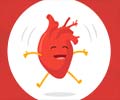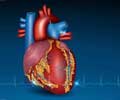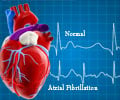Smoking and Heart Disease
Smoking and tobacco have been linked to the early onset of heart diseases. Research studies have shown that cigarette smokers are two to three times more likely to die from coronary heart diseases than non- smokers. Stay away from tobacco smoke.
Inhaling tobacco smoke causes many immediate responses within the heart and its blood vessels. Within a minute the heart begins to beat faster. Carbon monoxide in cigarette smoke exerts a negative effect on the heart. It reduces the blood’s oxygen carrying capability.
Smoking tends to increase the blood cholesterol levels. Compared to non-smokers the ratio of HDL (good cholesterol) to LDL (bad cholesterol) also tends to be lower in smokers.
Smoking also raises the level of fibrinogen (a protein which causes blood to clot) and increases platelet production (involved in the formation of blood clot), which makes blood stickier.
Carbon monoxide attaches itself more easily to haemoglobin (the oxygen carrying pigment present in the red blood cells) much more readily than oxygen does. This reduces the amount of oxygen available to the tissues.
All these above-mentioned factors make smokers more susceptible to heart diseases.

Cigarette smoking is injurious to your health


























